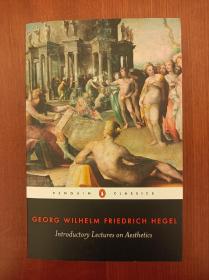
Introductory Lectures on Aesthetics(现货,实拍书影)
G. W. F. Hegel: Introductory Lectures on Aesthetics
¥ 86 九五品
仅1件
上海长宁
认证卖家担保交易快速发货售后保障
作者Georg Wilhelm Friedrich Hegel (author); Bernard Bosanquet (translator); Michael Wood (introduction), G. W. F. Hegel
出版社Penguin Classics
ISBN9780140433357
出版时间1994
装帧平装
页数256页
货号t2
上书时间2021-12-01
- 在售商品 暂无
- 平均发货时间 13小时
- 好评率 暂无
- 最新上架
商品详情
- 品相描述:九五品
-
详见实拍书影
3@t2
- 商品描述
-
No philosopher has held a higher opinion of art than Hegel, yet nor was any so profoundly pessimistic about its prospects despite living in the German golden age of Goethe, Mozart and Schiller. For if the artists of classical Greece could find the perfect fusion of content and form, modernity faced complicating and ultimately disabling questions. Hegel's "Introductory Lectures on Aesthetics" were delivered in Berlin in the 1820s and stand today as a passionately argued work that challenged the ability of art to respond to the modern world.
Hegel (1770 to 1831) is one of the most important of modern philosophers, due to his relation to Marx and the support his philosophy seemed to offer to theories of nationalism and social democracy, and his impact on a range of humanities. He is best known for The Phenomenology of Spirit, The Science of Logic, The Encyclopedia of the Philosophical Sciences, and The Philosophy of Right, as well as his lectures, which were published posthumously by his friends. Bernard Bosanquet was a Fellow of University College, Oxford teaching philosophy and ancient history. From 1903 to 1908 he held the chair of moral philosophy at St Andrews. He died in 1923.
— 没有更多了 —





















以下为对购买帮助不大的评价